Episodes
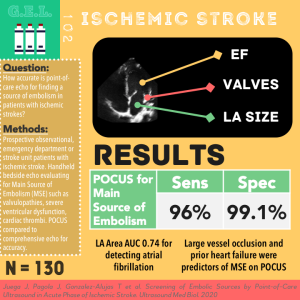
Monday Nov 23, 2020
Ischemic Stroke
Monday Nov 23, 2020
Monday Nov 23, 2020
I know your first thought - is this for real?! The POCUS enthusiasts have gone off the rails again! Well - that very well may be the case, but hear me out- this is a fascinating idea. This article presents a novel strategy for searching for embolic etiologies in the acute phase of ischemic strokes (which means even climbing into CT with a handheld device!). "Why?" you may rightfully ask. That is a really great question, and I'm glad you asked. I guess you will have to check out this episode to find out! https://www.ultrasoundgel.org/102 https://pubmed.ncbi.nlm.nih.gov/32532655/
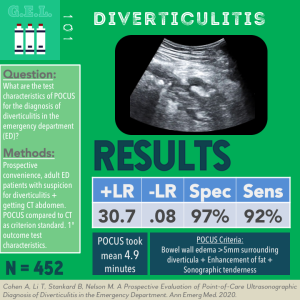
Monday Nov 09, 2020
Diverticulitis
Monday Nov 09, 2020
Monday Nov 09, 2020
Ultrasound of the bowel is a relatively new application for POCUS users. It came into the spotlight proving itself with small bowel obstruction, but now we are slowly peristalsing even further down the colon of indications. You may be surprised to find that you can actually see diverticulitis on ultrasound, but it turns out it's not that hard! The question is - how reliable are the sonographic findings? This study is one of the largest to compare POCUS to CT to investigate this important application. https://www.ultrasoundgel.org/101 https://pubmed.ncbi.nlm.nih.gov/32653332/

Monday Oct 12, 2020
G.E.L. 100
Monday Oct 12, 2020
Monday Oct 12, 2020
Well...we finally made it. This is the 100th episode of the Ultrasound G.E.L. Podcast! The whole team is on this one, and we discuss thoughts sent in by our listeners on the future of point-of-care ultrasound research. Also reflections, plans, and thank yous. https://www.ultrasoundgel.org/100
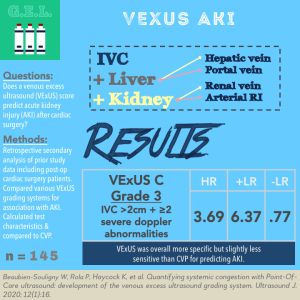
Monday Sep 28, 2020
VExUS
Monday Sep 28, 2020
Monday Sep 28, 2020
You may have heard whispers of a magical new way to determine if your patient has too much fluid on board. The VExuS (Venous Excess UltraSound) grading system has been described as a way to use the IVC in combination with abdominal organ doppler in order to determine the degree of venous congestion. This is the first study that takes a look at the VExUS system to see if it can predict acute kidney injury in post-operative patients. https://www.ultrasoundgel.org/99 https://www.ncbi.nlm.nih.gov/pmc/articles/PMC7142196/
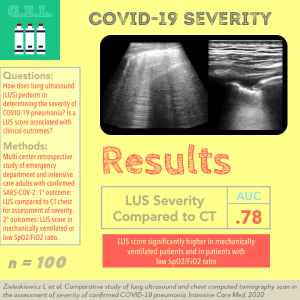
Monday Sep 14, 2020
COVID-19 Severity
Monday Sep 14, 2020
Monday Sep 14, 2020
We haven't discussed COVID-19 for a long time, despite the explosion of POCUS articles on how ultrasound can be used during this pandemic. Many of the articles have focused on the accuracy of POCUS for making the diagnosis, or comparing the ultrasound findings to those on CT. These are helpful, but now what we really want are studies that help establish that POCUS is helping with delivering patient care - either diagnostically or prognostically. This article seems to take the first step in this direction by examining the prognostic utility of lung ultrasound in this disease. https://www.ultrasoundgel.org/98 https://pubmed.ncbi.nlm.nih.gov/32728966/
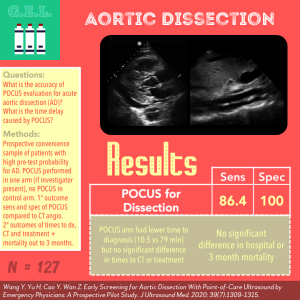
Monday Aug 31, 2020
Return of the Aortic Dissection
Monday Aug 31, 2020
Monday Aug 31, 2020
We are making some headway in the evidence behind using point-of-care ultrasound in aortic emergencies. This study takes a look at sensitivity and specificity for acute aortic dissection (which has been a few times before) and also compares POCUS to a control group to see if it causes delays or improves times to diagnosis or treatment (has not been done prospectively before). They even look at mortality! https://www.ultrasoundgel.org/97 https://pubmed.ncbi.nlm.nih.gov/31971274/
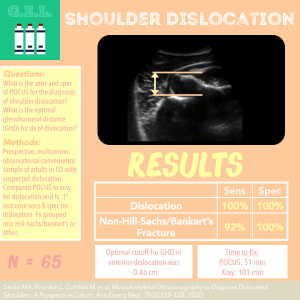
Monday Aug 03, 2020
Shoulder Dislocation Revisited
Monday Aug 03, 2020
Monday Aug 03, 2020
People have been using POCUS to diagnosis shoulder dislocation for a while now, although it is far from standard of care in most places. We have seen that it is really accurate compared to xray, but this well-done study adds some important information to the existing literature. They measure the glenohumeral distance in an attempt to make a quantifiable cut-off point for dislocation. They also take a look at potential time savings of ultrasound compared to xray! https://www.ultrasoundgel.org/96 https://pubmed.ncbi.nlm.nih.gov/32111508
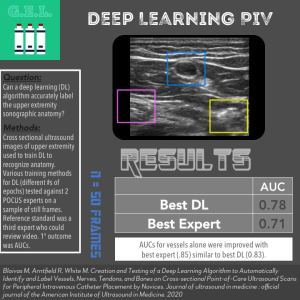
Monday Jul 06, 2020
Deep Learning for Peripheral IV Anatomy
Monday Jul 06, 2020
Monday Jul 06, 2020
Deep learning is a branch of artificial intelligence that holds a lot of promise for point-of-care ultrasound, but we don't have much data on how it performs. The fearless investigators in this fascinating study train a deep learning algorithm to recognize sonographic anatomy of the upper extremity and then pit it against expert POCUS users to see who can interpret the images most accurately! https://www.ultrasoundgel.org/95 https://pubmed.ncbi.nlm.nih.gov/32181922/
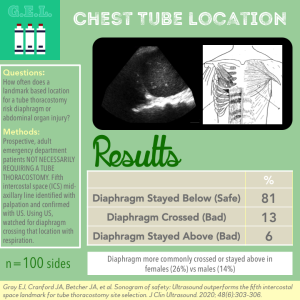
Monday Jun 22, 2020
Chest Tube Location
Monday Jun 22, 2020
Monday Jun 22, 2020
Placing a tube thoracostomy (aka chest tube) is a very useful procedure but can have complications of injuring the diaphragm or intraabdominal organs. Traditionally, the location for placement is selected using anatomic landmarks to find the correct intercostal space. This study questions the safety of this traditional location by using point-of-care ultrasound to visualize diaphragm movement during respirations. Is this the start of ultrasound-assisted chest tubes? https://www.ultrasoundgel.org/94 https://pubmed.ncbi.nlm.nih.gov/32333800/

Monday Jun 08, 2020
How to Do POCUS Research - Part 2
Monday Jun 08, 2020
Monday Jun 08, 2020
We are back with Part 2 of discussing POCUS research with renowned expert and researcher, Michael Gottlieb. More pearls, pitfalls, tips, and tricks to help you step up your POCUS research game. This is the final episode in this two-part special edition, and we wrap it up as always with some take home points! https://www.ultrasoundgel.org/93

